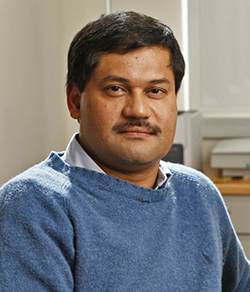Learning is layered, with cognitive, physiological, emotional and societal components. Technology, especially the increasing use of new sensing devices and interactive machines, adds complexity as well as opportunity – yet little research has been done on how best to measure what works.
A collaboration between Vanderbilt School of Engineering and North Carolina State University aims to jump-start that process. The project is among the first recipients of National Science Foundation grants to address societal challenges through cross-disciplinary research.
The NSF Growing Convergent Research program supports the agency’s “10 Big Ideas for Future NSF Investments,” a set of cutting-edge research agendas especially suited for federal support.
With the grant, Vanderbilt and NCSU will bring together experts to advance understanding of how best to collect and analyze data from widely diverse sources during the processes of learning and problem solving. The goal is establishing baseline best practices to shape advanced learning technology environments, such as intelligent tutoring systems, to better interact with learners along multiple dimensions: cognitive, metacognitive, affect, and motivation.
“There are multiple processes involved in learning,” said Gautam Biswas, Cornelius Vanderbilt Professor of Engineering and professor of computer science and computer engineering.

“With advances in sensor and computing technology, we can analyze a lot about a student when involved in learning tasks,” said Biswas, who also is senior research scientist at the Vanderbilt Institute for Software Integrated Systems. “But not much has been done on integrating the various factors that affect their learning, for example, their cognitive, metacognitive and emotional state, to help them become better learners.
“This is partly because we do not have standardized mechanisms that describe how data should be collected, analyzed and presented in ways that give us the whole picture,” he said.
Technology, for example, already can track students’ eye movements to capture where on a screen their attention settles, when learners are distracted, and when they are excited, confused, and frustrated. Algorithms within computer-based intelligent learning systems can measure whether students understand the material at a basic level or not – and whether they can take the next steps to solve problems and self-regulate their behaviors, Biswas said.
Lack of methods to integrate such data is an issue, along with creating a common language across disciplines to bring together the psychologists, cognitive and learning scientists, and computer scientists and engineers, because each group is expert at solving a piece of the bigger puzzle, he said.

Biswas studies learning and learning environments. Where students and advanced learning technologies intersect has implications far broader than school and university settings. Intelligent, interactive, and highly networked machines are a growing part of the landscape, particularly at the workplace. Employee interaction with them affects productivity, job opportunities, training, retraining, and lifelong learning.
The $100,000 NSF Convergence grant will fund two workshops. The first is in Raleigh, NC, this falls under the direction of Roger Azevedo, a professor of psychology who is part of NCSU’s faculty cluster in Digital Transformation of Education. Azevedo, who is co-investigator on the grant, studies the role of cognitive, metacognitive, affective and motivational self-regulatory processes in computer-based learning environments. Biswas at the Vanderbilt School of Engineering will lead the second workshop, which will focus more on technologies, data collection mechanisms, and the machine learning algorithms to support online analyses, next spring.
The goal is bringing together experts in cognitive psychology, learning sciences, data science, computer science, and engineering disciplines to the workshop to discuss the state of the art, and develop a work plan for future research in multi-modal analytics for intelligent learning environments.
“Work at the Human-Technology Frontier: Shaping the Future” is one of five big-picture advances NSF’s Growing Convergent Research targets.
“Convergence is a deeper, more intentional approach to the integration of knowledge, techniques, and expertise from multiple disciplines in order to address the most compelling scientific and societal challenges,” NSF Director France Córdova said when the first awards were announced.
“NSF has supported cross-disciplinary collaboration for decades,” Córdova said.
Biswas said he is excited to contribute to a roadmap that will also help advance his work, which involves “developing learning technologies for classrooms and the home, where students learn by interacting with virtual agents that not only deliver content but provide guidance and motivation to help them become more self-regulated and life-long learners.”
Media Inquiries:
Pamela Coyle, (615) 343-5495
Pam.Coyle@Vanderbilt.edu
Twitter @VUEngineering